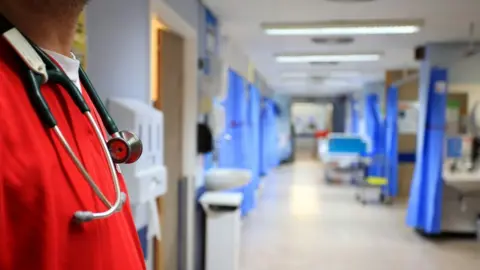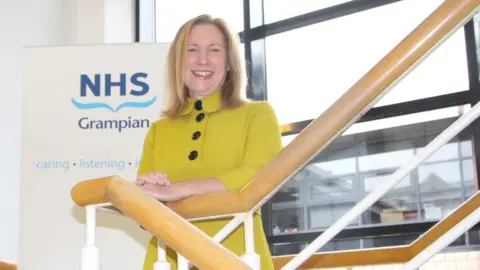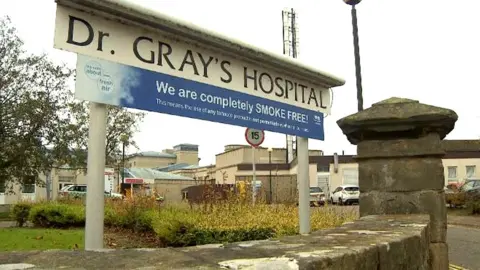Covid in Scotland: Surgery backlog 'could take years' to tackle
 PA Media
PA MediaThe backlog of surgery and procedures across Scotland caused by the pandemic could take years to tackle, the chief executive of NHS Grampian has said.
Prof Caroline Hiscox said waiting lists were currently the longest since records began, with Covid disruption expected to continue.
Aberdeen Royal Infirmary (ARI) and Dr Gray's in Elgin have been among several hospitals at capacity in recent weeks.
They have been dealing with a rise in patients and staff absences.
Prof Hiscox spoke to BBC Scotland about how the hospital service had been affected by the virus, and what plans are in place to aid the recovery.
She said: "The modelling that we have is looking at lots of different scenarios.
"So, locally and nationally, we are working really closely with other boards and the Scottish government to understand what is the recovery programme for surgery.
"And also, how does that need to look different to allow us to recover waiting lists that are bigger than we have ever seen before in NHS Scotland since we started recording them.
"We are definitely not talking weeks or months, we are talking years to be able stabilise and recover and redesign our approach to surgery in NHS Scotland."
 NHS Grampian
NHS GrampianARI and Dr Gray's were placed on "code black" status earlier this month, having reached full capacity.
In recent days, a "small number" of staff - nurses and healthcare support workers - have been released from the vaccination programme to provide additional support at Dr Gray's.
'Recuperation time'
Asked how long that situation could continue, Prof Hiscox said: "I think if I had the answer to that I would be a very fortunate chief executive and I think that's one of the challenges in regard to the situation that we are facing.
"So I try to avoid the use of language such as crisis, but actually I'm sure some colleagues would concur with that view.
"This is a combination of, yes, the third wave of Covid, but also the backdrop of a health and care sector that has been working relentlessly for 18 months.
"And we are now experiencing demands on our system that we would normally experience in the winter months. They are tired."

She described the "heroic" workforce as the health service's "greatest asset", but the "greatest vulnerability" at the same time.
"Let's make no bones about it, before Covid our workforce was fragile in regards to our vacancies and our ability to recruit and retain in the north east", Prof Hiscox said.
"During wave one and wave two we had an additional 1,000 staff came to work with us, which was tremendous. The rest of the country is remobilising, so these people have gone back to do what they need to do.
"On top of the underlying vacancies, this is the school holidays - I feel very strongly that our health and care staff need to have their annual leave like everyone else. It's critically important they get some recuperation time. On top of that, we have the additional loss of those who are isolating."


